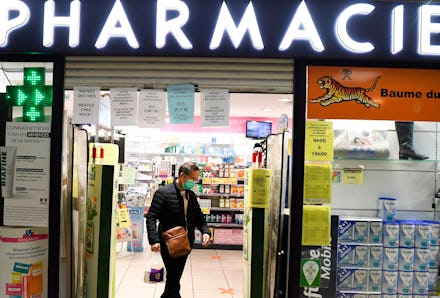People in Spain and France can escape domestic abuse by using a safe word at a pharmacy

Leaders of the White House's coronavirus task force insist that staying home is the fastest way to slow the spread of coronavirus, and that it's the easiest way to care for yourself and the safety of the public. But for survivors of intimate partner violence, home can be a dangerous place. In fact, social isolation related to coronavirus has led to increased reports of domestic violence; in Fresno, California, the sheriff’s office and police department both saw a spike in domestic violence calls last month, which coincided with the first week of the shelter-in-place order in the state.
The National Domestic Violence Hotline says that coronavirus may endanger survivors of intimate partner violence in particular, with social distancing guidelines encouraging isolation. Abusers may withhold medical devices or medication from their partners, or they could propagate misinformation as a way to instill fear and encourage dependence. Survivors additionally may not feel safe in shelters right now, while being in close quarters with groups of people increases the risk of contracting coronavirus.
In Europe, advocates are adapting to the challenge of assisting survivors during the coronavirus outbreak by enlisting pharmacies and drug stores in the mission. France is under a nationwide lockdown until April 15, and citizens can't leave their homes except to visit "essential" businesses, like pharmacies and grocery stores. This week, after French police reported that across the country they had received at least 30% more reports of domestic violence and two cases of femicide, a legislator rolled out a new initiative to help: A person experiencing violence can now say a code word to a staff member or pharmacist, who will know to call the police to intervene.
The first person to use the tool was a woman in the northeastern French town of Nancy, who reported that her husband had abused her. After she told a pharmacist about the abuse, her husband was arrested by the police.
France's initiative follows what neighboring country Spain instituted to aid survivors. Spain is among the countries hardest hit by the coronavirus outbreak, and now its residents can also go to a pharmacist for help; if they say the phrase "mask 19," it signals they're in need. The Spanish government has also made it clear that a survivor will not be fined for leaving their house if they seek to report an abuser.
When most public health resources are being diverted to mitigate the spread of coronavirus, officials say that this solution ensures that survivors still have a way to ask for help. The French government also said that it would pay for 20,000 nights in hotel rooms for survivors, allocate $1.1 million to organizations fighting domestic violence, and open pop-up counseling centers at grocery stores in Paris and northern France to start.
It's not yet clear whether essential businesses in the U.S. will adopt similar measures. But in Maine, advocates are working with the court system to develop new ways of counseling survivors and have worked to keep the courts open, dubbing them essential services. In some instances, court proceedings can help survivors connect with advocacy organizations, help establish a pattern of abuse, or file for custody or restraining orders. While other judicial systems around the country are slowing or halting legal proceedings, Through These Doors, an advocacy and legal protection group, is “helping survivors understand how to fill out and file forms, identify and strategize around safety needs, and plan for final hearings, as well as providing direct connections to other critical community resources.”
Financial stress, insecurity, and a lack of control are all reasons that abuse spikes during natural disasters and national emergencies, and the coronavirus outbreak is no different. Additionally, for many survivors, reporting abuse to local police can actually increase violence in the home. North Carolina advocacy organizations encourage families to create routines that help establish structure and predictability, which can decrease anxiety and stress and thus hopefully lower the risk of domestic abuse.
If you need help, the Anti-Violence Project is a 24-hour hotline for LGBTQ people experiencing abuse or hate-based violence; call 212-714-1141 for assistance in English or Spanish. The National Domestic Violence Hotline also operates 24/7 and in more than 200 languages; call 1-800-799-SAFE, text LOVEIS to 22522, or chat online with a representative if you need assistance. If you are in immediate danger, call 911.